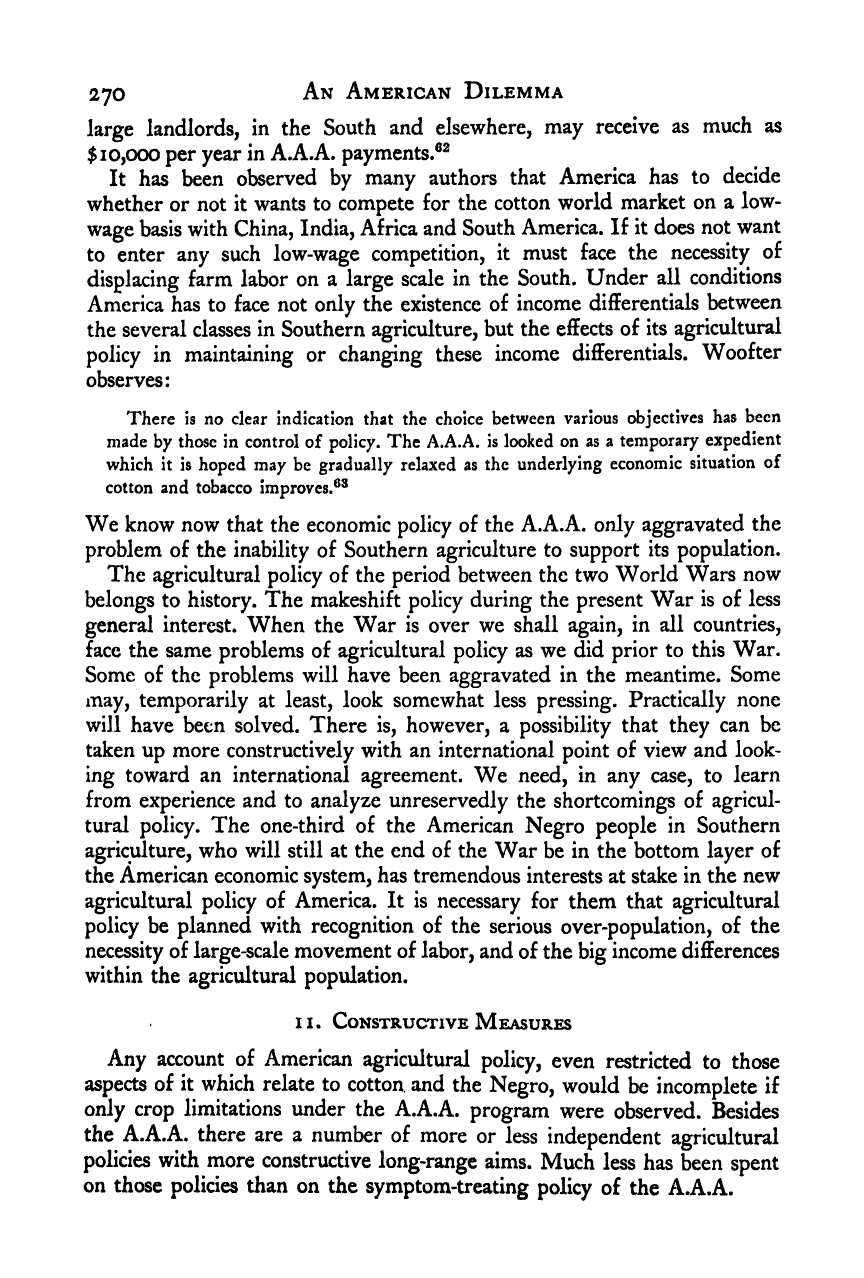Note: Gunnar Myrdal died in 1987, less than 70 years ago. Therefore, this work is protected by copyright, restricting your legal rights to reproduce it. However, you are welcome to view it on screen, as you do now. Read more about copyright.
Full resolution (TIFF) - On this page / på denna sida - IV. Economics - 12. New Blows to Southern Agriculture During the ’Thirties: Trends and Policies - 10. Social Evaluation of the A.A.A - 11. Constructive Measures

<< prev. page << föreg. sida << >> nästa sida >> next page >>
Below is the raw OCR text
from the above scanned image.
Do you see an error? Proofread the page now!
Här nedan syns maskintolkade texten från faksimilbilden ovan.
Ser du något fel? Korrekturläs sidan nu!
This page has never been proofread. / Denna sida har aldrig korrekturlästs.
270 An American Dilemma
large landlords, in the South and elsewhere, may receive as much as
$10,000 per year in A.A.A. payments.®^
It has been observed by many authors that America has to decide
whether or not it wants to compete for the cotton world market on a low-
wage basis with China, India, Africa and South America. If it does not want
to enter any such low-wage competition, it must face the necessity of
displacing farm labor on a large scale in the South. Under all conditions
America has to face not only the existence of income differentials between
the several classes in Southern agriculture, but the effects of its agricultural
policy in maintaining or changing these income differentials. Woofter
observes:
There is no clear indication that the choice between various objectives has been
made by those in control of policy. The A.A.A. is looked on as a temporary expedient
which it is hoped may be gradually relaxed as the underlying economic situation of
cotton and tobacco improves.®®
We know now that the economic policy of the A.A.A. only aggravated the
problem of the inability of Southern agriculture to support its population.
The agricultural policy of the period between the two World Wars now
belongs to history. The makeshift policy during the present War is of less
general interest. When the War is over we shall again, in all countries,
face the same problems of agricultural policy as we did prior to this War.
Some of the problems will have been aggravated in the meantime. Some
may, temporarily at least, look somewhat less pressing. Practically none
will have been solved. There is, however, a possibility that they can be
taken up more constructively with an international point of view and look-
ing toward an international agreement. We need, in any case, to learn
from experience and to analyze unreservedly the shortcomings of agricul-
tural policy. The one-third of the American Negro people in Southern
agriculture, who will still at the end of the War be in the bottom layer of
the American economic system, has tremendous interests at stake in the new
agricultural policy of America. It is necessary for them that agricultural
policy be planned with recognition of the serious over-population, of the
necessity of large-scale movement of labor, and of the big income differences
within the agricultural population.
II. Constructive Measures
Any account of American agricultural policy, even restricted to those
aspects of it which relate to cotton and the Negro, would be incomplete if
only crop limitations under the A.A.A. program were observed. Besides
the A.A.A. there are a number of more or less independent agricultural
policies with more constructive long-range aims. Much less has been spent
on those policies than on the symptom-treating policy of the A.A.A.
<< prev. page << föreg. sida << >> nästa sida >> next page >>